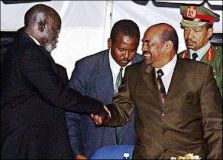Obstacles remain for southern Sudan’s peace hopes
By Andrew England, Financial Times
NAIROBI, Jan 2, 2005 — African leaders and western diplomats are expected to gather in Nairobi on Sunday to witness what could be a historic agreement to end Sudan’s 21-year civil war.

|
|
Sudanese President Omar El Bashir (R) shakes hands with the leader of Sudan’s People Liberation Movement/Army John Garang after the signing of accords on two outstanding issues paving the way for the signing of a comprehensive peace deal. (AFP) . |
The signing of a peace deal between the Islamic government and the southern-based Sudan People’s Liberation Army (SPLA) will in theory mark the beginning of a new era for a nation blighted by decades of poor government and civil conflict.
The belligerents on Friday signed two protocols clearing the last obstacles to a comprehensive accord.
For war-weary Sudanese, the breakthrough offers the hope of much-needed development after millions of dollars were wasted on a conflict that killed an estimated 2m people.
It also holds the promise of elections after more than a decade of autocratic rule by a government accused of human rights abuses and of sponsoring terrorists including Osama bin Laden.
And there is the hope that it will help end Sudan’s latest crisis, a separate insurgency in the western region of Darfur. Yet the challenges and potential pitfalls that lie ahead are numerous.
The deal gives the SPLA 28 per cent of the posts in a transitional government. The ruling National Congress will have 52 per cent, and other groups will fill the remaining positions. John Garang, the SPLA’s leader, is to be sworn in as vice-president during a six-month period beginning on Monday.
Elections are to be held in three years. At the end of a transition period lasting six years, southerners will decide whether to secede.
But each side deeply mistrusts the other.
The SPLA took up arms for a second time in 1983 in pursuit of a greater share of wealth and power for the south, which is inhabited mainly by Africans who are Christians or who follow traditional beliefs.
Since independence, Sudan has been run by Arab-dominated administrations, and Africa’s largest country remains very underdeveloped, despite vast resources.
People in the east, west and south complain of marginalisation. The Darfur crisis erupted in February 2003 when rebels took up arms with demands similar to the SPLA’s. There have been concerns that eastern groups could follow suit.
Meanwhile, Darfur continues to cast a huge shadow over the north-south peace process and will be a key test of the ability of the SPLA and the National Congress to work together.
Diplomats hope the southern deal will help end the insurgency because the SPLA had links to the Darfur insurgents. Some also believe administrative arrangements planned for three disputed areas in central Sudan could be used as models for other marginalised areas.
But increasing violence threatens the peace dividends expected by Khartoum, which hopes to be welcomed back into the international fold after years as a pariah state.
The European Union has said it will begin the process of unlocking ?400m (£280m, $540m) in development funds held back since 1990 but will be closely watching developments.
A UK-led international initiative to help with Sudan’s $26bn debt is expected to be delayed, however.
And it is unlikely that the US Congress, which has described the violence in Darfur as genocide, will allow sanctions to be lifted unless there is a dramatic improvement there.
Still, the international community’s support for the peace process will be critical to its success.
“If the international community is not diligent, [the process] will go off-line so quickly our heads will spin because there will be such unwillingness to do the things they have made concessions on,” warns John Prendergast, of the International Crisis Group think-tank. “There’s a tremendous gulf between expectations and reality.”
